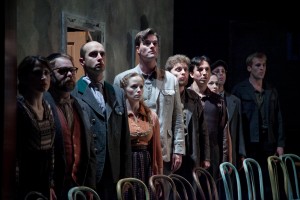Moment Guest Blog
Grappling with the History of Polish Jews and Catholics
By Alfred Munzer
Earlier this month, as I watched the Theater J production of Our Class, I revisited a painful part of my family’s history in Poland. The play, being performed in Washington, D.C., chronicles the lives of ten friends—five Catholics and five Jews—over the course of 80 years beginning in 1926. The play comes to grips with one of the most painful aspects of the Holocaust when political differences and foreign invasions rekindled ancient religious hatreds that pitted neighbor against neighbor. It portrays the inexorable tragic descent from the innocence of childhood into the hell on earth that mirrored the experience of my own family. And it leaves us with the question whether reconciliation after such horror is ever possible.
My family history, wrapped up in the history of Poland and the Holocaust, is not something upon which I often care to reflect. My mother was born in Rymanow, a small town in Polish Galicia whose Jewish population was deported to Belzec, a Nazi extermination camp. She left Rymanow to avoid persecution in 1925 for Berlin, and in 1932 went on to the Netherlands where she married my father. Her brother, who found asylum in Bolivia, was the only other family member who was spared the fate of the Rymanow Jews.
August 13, 1942 was the day when the last of Rymanow’s Jews were deported. In 2008, I was invited to come from the United States to join Rymanow’s commemoration of those who had perished in the Holocaust. Alongside hundreds of Poles who had never been inside a Jewish house of worship, I visited the town’s ruined but once magnificent 17th century synagogue. I said Kaddish, the Jewish prayer of mourning, at an ecumenical memorial service in the Jewish cemetery where 500 disabled or elderly Jews, deemed unfit even for deportation, had been shot, early that same day in 1942. I attended a rally in the town square where the remaining 800 Jews had been told to report with all their belongings. And with about a hundred others, I then followed in the footsteps the Rymanow Jews took in 1942 for a five kilometer march to the railway station. There, I lit memorial candles and watched as dignitaries laid wreaths in a cattle car of the same vintage as the ones used for deportation, and I listened as a young violinist from the local high school led the crowd in the Polish national anthem.
As I looked at the faces of Rymanow’s current inhabitants, I could not help but wonder who among them had been willing collaborators with the Nazi hordes and who, like the protagonists in Our Class, had stolen their Jewish neighbors’ silver candlesticks and trays. Or were there some who, like Wladeck in Our Class, who had tried to save a classmate like Rachelke?
I had not come to Rymanow to simply find the names of my forbears on the gravestones in the cemetery, but rather to satisfy a far deeper need, a thirst for some sign of redemption from the horrors of that day in August 1942. The answer did not come in the Jewish prayer for the dead movingly chanted by a rabbi or in the sincere words of the parish priest. It came in the form of the high school students who spent their vacation cleaning tombstones in the Jewish cemetery. And it came, above all, in the form of an elderly, somewhat frightened Polish woman who hesitated, then closed her eyes in prayer and crossed herself at the foot of the ancient grave of the Chassidic Master, Menachem Mendel of Rymanow.
There is no redemption, only regret, at the conclusion of Our Class. But the image of that woman is my personal postscript to the play. She used a gesture sacred to her Catholic faith to pay homage to a sainted Jewish figure. Is there a more profound act of contrition and appeal for reconciliation? The brutal honesty of Our Class, written as it is by a Christian Polish playwright, is another timeless and universal plea for an end to hatred and prejudice.
The author is a Jewish physician residing in Washington, DC, whose mother fled Poland in 1925.


Thank you for your touching and articulate article.
It is respect, friendship and individual input of local Poles and uprooted Jews or their children – who found root in Israel and different parts of the world – which brought about the commemoration to which the author of this article was invited.
Those individuals who initiated and keep on developing the yearly “Spotkanie Rymanow” commemoration events, which over the years are growing and blooming, should be credited, encouraged…and imitated.
Those who have roots in Rymanow, (Riminov in Yddish) or others, might like to know about the ” Friends of Rymanow ” group on Facebook.
yasher koach!